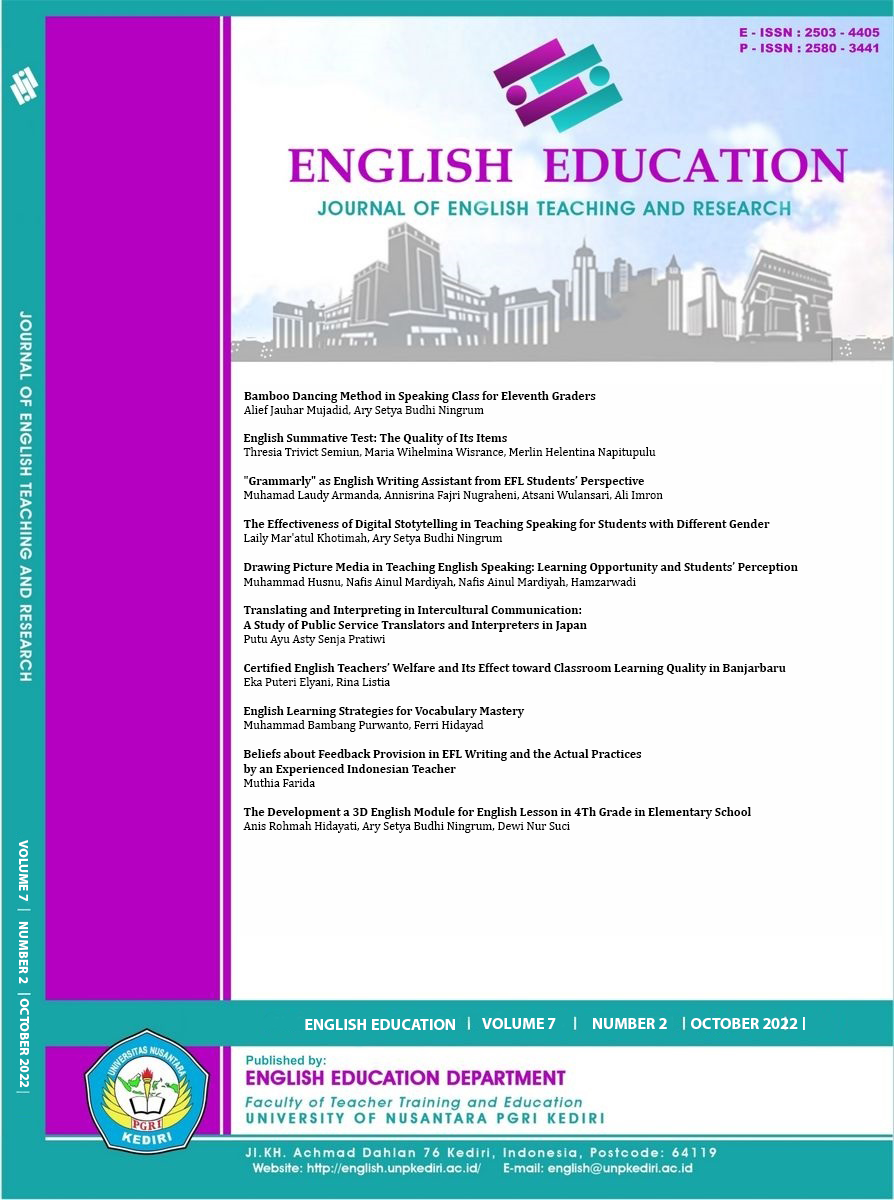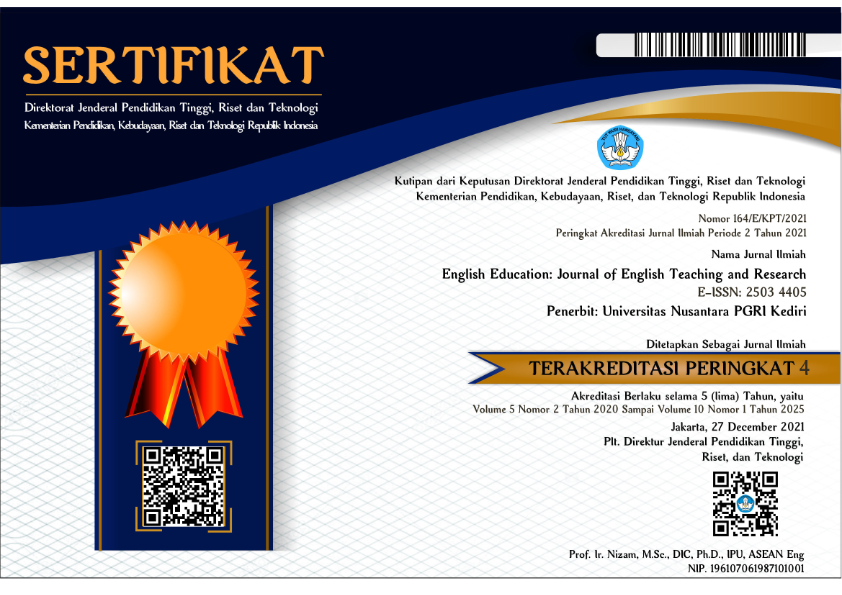Beliefs about Feedback Provision in EFL Writing and the Actual Practices by an Experienced Indonesian Teacher
DOI:
https://doi.org/10.29407/jetar.v7i2.18519Keywords:
beliefs, feedback provision, experienced Indonesian teacher, EFL writingAbstract
This article reports the research on an experienced Indonesian teacher’s beliefs about feedback provision and her actual practices in an EFL writing classroom. Previous work has conducted analyses of teacher beliefs about feedback, but there is a scarce of research focusing on teacher beliefs and practices on feedback provision to experienced EFL teacher, especially in the Indonesian context. Therefore, this case study investigates an experiencdEFL teacher who taught advanced writing courses in one of the leading universities in Indonesia. The data used were qualitative. In order to gain the data, a preliminary interview, observation, and a retrospective interview were carried out, respectively. Samples of the students’ work were reviewed as a supplementary. The data analysis was done through data transcription, data reading, data data reduction and categorization, data comparison, data description and interpretation, and finally drawing conclusion. The findings show that the teacher believed that feedback was essential and, thus, she put herself as a major source of feedback for her students. Her beliefs influenced her practices to optimize her feedback provision, including her preferences in terms of modes, types, and sources of feedback. Her professional coursework and experiences played important roles in leading consistency between her beliefs and practices. For future teaching practices, it is suggested for teachers to equip themselves with adequate knowledge and skills, and to incorporate various methods to maximize their feedback provision. For future research, it is strongly recommended to use this reflective interview to help capture teacher beliefs behind their actual practices.
Downloads
References
Ahmadi, D., Maftoon, P., & Mehrdad, A. G. (2012). Investigating the effects of two types of feedback on EFL students’ writing. Precedia – Social and Behavioral Sciences, 46, 2590-2595. http://dx.doi.org/10.1016/j.sbspro.2012.05.529.
Baghzou, S. (2011). The effects of content feedback on students’ writing. Ankara Üniversitesi Dil ve Tarih-Coğrafya Fakültesi Dergisi, 51(2), 169-180.
Birello, M. 2012. Teacher Cognition and Language Teacher Education: Beliefs and Practice. A Conversation with Simon Borg. Bellaterra Journal of Teaching & Learning Language & Literature, 5(2): 88-94. https://raco.cat/index.php/Bellaterra/article/view/253372.
Borg, S. (2003). Teacher cognition in language teaching: A review of research on what language teachers think, know, believe, and do. Language Teaching, 36(2), 81-109. http://dx.doi.org/10.1017/S0261444803001903
Cahyono, B. Y., & Widiati, U. (2011). The teaching of English as a foreign language in Indonesia. Malang: State University of Malang Press.
Cheng X, Zhang LJ, & Yan Q. (2021). Exploring teacher written feedback in EFL writing classrooms: Beliefs and practices in interaction. Language Teaching Research, DOI:10.1177/13621688211057665
Ferede, T., Melese, E., & Tefera, E. (2012). A descriptive survey on teachers’ perception of efl writing and their practice of teaching writing: Prepatory schools in Jumma Zone in focus. Ethiopian Journal of Education and Science, 8(1), 29-52.
Gamlem, S.M. (2015) Feedback to support learning: changes in teachers’ practice and beliefs. Teacher Development, 19(4), 461-482. DOI: 10.1080/13664530.2015.1060254
Harjanto, I. (2014). Teaching EFL academic writing through I-search. Language Education in Asia, 5(1), 151-159. http://dx.doi.org/10.5746/LEiA/14/V5/I1/A12/Harjanto.
Hidayah, N., Suparno, & Haryati, S. (2021). EFL teachers' beliefs and practices in using teacher written corrective feedback on students' writing. English Education Journal, 10(1), 1-12. https://doi.org/10.20961/ee.v10i1.53294
Hyland, K. (2007). Genre and second language writing. East Lansing, Michigan: Michigan University Press.
Ismail, N., Maulan, S., & Hasan, N. H. (2008). The Impact of teacher feedback on ESL students’ writing performance. Academic Journal of Social Studies, 8(1), 45-54.
Junqueira, I., & Payanti, C. (2015). “I just want to do it right, but it’s so hard”: A novice teacher’s written feedback beliefs and practices. Journal of Second Language Writing, 27(1), 19-36. http://dx.doi.org/10.1016/j.jslw.2014.11.001
Kahraman, A. (2013). Affective and cognitive effects of coded teacher feedback on FL writing students. H. U. Journal of Education, 28(1), 189-201.
Khanalizadeh, B. & Allami, H. 2012. The Impact of Teachers’ Beliefs on EFL Writing Instruction. Theory and Practice in Language Studies, 2(2): 334-342. DOI:10.4304/tpls.2.2.334-342
Larenas, C.D., Hernandez, P.A., & Navarette, M.O. (2015). A case study on EFL teachers’ beliefs about the teaching and learning of English in public education. Porta Linguarium, 23, 171-186. DOI: http://dx.doi.org/10.30827/Digibug.53765
Lee, I. (2008a). Student reactions to teacher feedback in two Hongkong secondary classrooms. Journal of Second Language Writing, 17, 144-164. http://dx.doi.org/10.1016/j.jslw.2007.12.001
Lee, I. (2008b). understanding teachers’ written feedback practices in Hong Kong secondary classrooms. Journal of Second Language Writing, 17, 69-85. http://dx.doi.org/10.1016/j.jlsw.2007.10.001
Mellati, M., Khademi, M., & Shirzadeh, A. (2015). The relationships among sources of teacher pedagogical beliefs, teaching experiences, and student outcomes. International Journal of Applied Linguistics and English Literature, 4(2), 177-184. http://dx.doi.org/10.7575/aiac.ijalel.v.4n.2p.177
Melketo, T.A. 2012. Exploring Tensions between English Teachers’ Beliefs and Practices in Teaching Writing. International Higher Education Teaching and Learning Association, 2(2), 98-114.
Miao, Y., Badger, R., & Zhen, Y. (2006). A comparative study of peer and teacher feedback in a Chinese EFL writing class. Journal of Second Language Writing, 15(1), 179-200. http://dx.doi.org/10.1016/j.jslw.2006.09.004
Mulati, D.F., Nurkamto, J., & Drajati, N.A. (2020). The teachers’ beliefs in teacher written corrective feedback on the students’ writing. JOALL, 5(1), 1-10. http://dx.doi.org/10.33369/joall.v5i1.7644
Nation, I.S.P. (2009). Teaching ESL/EFL reading and writing. New York: Routledge.
Nicol, D. (2010). From monologue to dialogue: improving written feedback processes in mass higher education. Assessment & Evaluation in Higher Education, 35(5), 50-517. http://dx.doi/10.1080/02602931003786559
Perez, R. C., Fuentealba, M. M., Barra, M. M. D. L, Rojas, J. S., & Cisternas, M.T. (2014).The impact of explicit feedback on EFL high school students engaged in writing tasks. Frofile, 15(2), 149-163.
Pham, T.K.D. (2015). Different forms of corrective feedback and their effects on l2 students’ writing accuracy: a case study. Asian Journal of Educationl Research, 3(1), 10-17.
Rahanama, M., Rad, N. F., & Razmjoo, S.A. (2015). Why focused feedback? Corrective feedback on EFL learners’ writing Accuracy. International Journal of Review in Life Sciences, 5(8), 637-643.
Shulin, Y. 2013. EFL Teachers’ Beliefs and Practices Regarding Peer Feedback in L2 Writing Classrooms. Polyglossia, 24, 74-79.
Sotoudehnama, E., & Molavi, M. (2014). The effect of teachers’ written comment types and Iranian EFL learners’ attitudes. The Journal of Asia TEFL, 11(4), 21-51.
Srichanyachon, N. (2012). Teacher written feedback for L2 learners’ writing development. Silpakon University Journal of Social Sciences, Humanities, and Arts, 12(1), 7-17.
Sujarwati, I., Saleh, M., & Fitriati, S.W. (2019). The provision of written corrective feedback on student writing: belief and practice. International Conference on Science and Education and Technology (ISET 2019). https://www.atlantis-press.com/proceedings/iset-19/125941404
Susanti, R. (2013). Students’ perceptions towards the effective feedback practices in the large EFL writing class based on participants, gender,and English proficiency level. Unpublished Masters Thesis. Pennsylvania: Indiana University of Pennsylvania.
Telҫeker, H., & Akcan, S. (2003). The effect of oral and written teacher feedback on students’ revisions in a process-oriented EFL writing class. TESL Reporter, 43(1), 31-49.
Vattøy, K.D. (2020). Teachers’ beliefs about feedback practice as related to student self-regulation, self-efficacy, and language skills in teaching English as a foreign language. Studies in Educational Evaluation, 64(100828). DOI: https://doi.org/10.1016/j.stueduc.2019.100828.
Wang, B., Yu, S. & Teo, T. (2018). Experienced EFL teachers’ beliefs about feedback on student oral presentations. Asian Journal of Second and Foreign Languange Education, 3(12), https://doi.org/10.1186/s40862-018-0053-3
Weekly, R., Pollard, A., & Macpherson, J. (2022). EAP corrective feedback in an EMI setting: student and teacher beliefs. Journal of English for Academic Purposes, 101157. https://doi.org/10.1016/j.jeap.2022.101157
William, J. G. (2013). Providing feedback on ESL students’ written assignments. The Internet TESL Journal, 19(10). http://iteslj.org/Techniques/Williams-Feedback.html
Yang, Y. C., Chao, Y. J., & Huang, C. (2014). The role of EFL teachers beliefs in web-supported writing instruction and feedback practices. NCUE Journal of Humanities, 9, 101-122.
Zheng, H. (2013). Teachers’ beliefs and practices: a dynamic and complex relationship. Asia-Pacific Journal of Teacher Education, 41(3): 331-343.
Downloads
Published
Issue
Section
License
Authors who publish with this journal agree to the following terms:
- Copyright on any article is retained by the author(s).
- The author grants the journal, the right of first publication with the work simultaneously licensed under a Creative Commons Attribution License that allows others to share the work with an acknowledgment of the work’s authorship and initial publication in this journal.
- Authors are able to enter into separate, additional contractual arrangements for the non-exclusive distribution of the journal’s published version of the work (e.g., post it to an institutional repository or publish it in a book), with an acknowledgment of its initial publication in this journal.
- Authors are permitted and encouraged to post their work online (e.g., in institutional repositories or on their website) prior to and during the submission process, as it can lead to productive exchanges, as well as earlier and greater citation of published work.
- The article and any associated published material is distributed under the Creative Commons Attribution-ShareAlike 4.0 International License








 Article template
Article template



